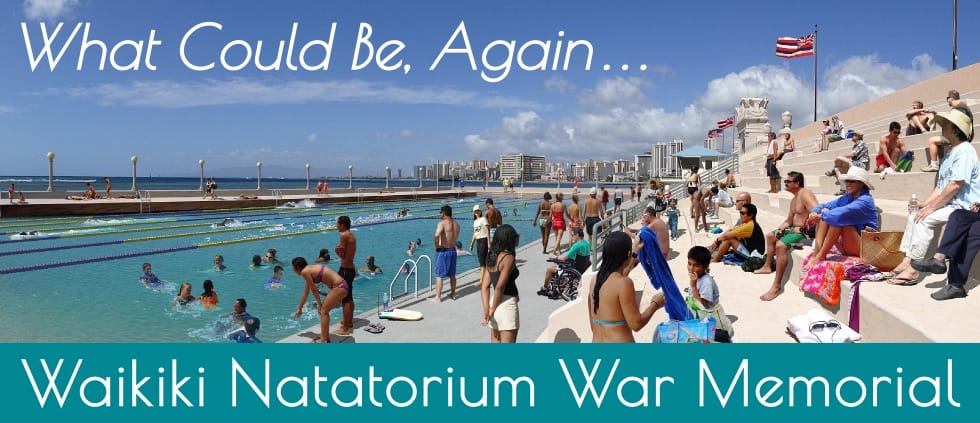The Star-Advertiser today published an opinion piece by Donna L. Ching, vice president of the Friends of the Natatorium. She salutes the efforts of the Memorial Task Force, now gathering input on how to honor Hawaii’s sons and daughters lost in Iraq, Afghanistan and the War on Terror. Donna suggests that the best course would be to locate a Gulf War Memorial at or adjacent to our Waikiki War Memorial Natatorium, creating in effect a memorial park to honor Hawaii’s fallen from all wars. We urge you to read Donna’s piece on the Star-Advertiser website and leave your comments there. If, however, you don’t have subscriber access to the newspaper’s site, you can read and comment right here. Mahalo for your support!
All of Hawaii’s war dead should be honored together
By Donna L. Ching
Only in Hawaii would cemeteries need to post entrance signs that scold, “No ball playing. No hibachis.”
Warnings notwithstanding, on visits to my grandmother’s grave, I still see families happily picnicking, playing ukulele and kids joyfully running around.
Once, I saw a baseball game played on a tombstone diamond with a plastic bat and wiffle ball.
My sisters and I have used my popo’s gravestone as a picnic table when we forget to bring something to put our food on. Running, singing, picnicking — what a mainlander might find disrespectful — we kamaaina find comforting and correct. What matters to us is being with the deceased and sharing the life you have built on the foundation that theirs provided. Why shouldn’t memorial parks be places for the living as much as for the dead? Isn’t that the point of a spent life? Creating something for those who follow?
As we ponder how best to honor those Hawaii has lost in the Gulf War, I connect my cemetery picnics with my years on the East Coast.
Yale University’s Woolsey Hall was where Glenn Miller performed and broadcast his Big Band music to World War II battlefronts in Europe. Because of its position on a major cross-campus thoroughfare, hundreds of students and New Haven residents pass through Woolsey’s Memorial Hall every day, walking between walls inscribed with the name of every Yale alumnus who has died in war.
Aside from our own Waikiki Natatorium, Woolsey is the only other war memorial I know of that has successfully integrated itself into the daily doings of the living. The memorial is not a destination to be visited. It is part of everyday life.
Unlike our Natatorium, Yale has maintained, with honor and beauty, Memorial Hall since 1902. And it still adds names today.
One day while living in New Haven, I was walking through Woolsey, and stopped in my tracks. A stone carver was adding the name of the most recent Yalie to die in war (the Gulf War). I watched, fascinated at his skill as he carved, freehand, into the marble panel of Memorial Hall’s entrance. Imagine the entrance to our own Natatorium similarly inscribed with every Hawaii war casualty.
A truly great memorial can provide inspiration many decades after it is built. Who knows what greatness might rise from the Natatorium if we can bring it back to life, along with the names of those it is dedicated to?
Imagine a place where the names of all of Hawaii’s sons and daughters lost in all wars are together in an honor roll where the living will assuredly make connection with them.
This is the Hawaiian way. We do not view the events of today in isolation; we reach back to our ancestors. We are not deluded with self-importance about our own achievements; we are grateful for the sacrifice of those before us. We do not mourn those who pass; we celebrate their lives and know that their spirits are with us today.
From the pre-statehood World War I combatants to today’s Gulf War, I’d like to see all of Hawaii’s war dead honored together. All in a place where people will naturally congregate. In a place of life, joy and gratitude.
I do not want to see those lost in the Gulf War forgotten like those of The Great War and eventually all other wars, whose monuments are allowed to fall into disrepair or located in some far corner of Honolulu away from the living. Let’s bring honor to all. Bring our fallen sons and daughters together and ensure that those who enjoy the freedom won by their blood are forever connected to the sacrifice paid.
You may contact the Memorial Task Force at 808-433-0423. The task force is co-chaired by Dave Brostrom and Allen Hoe, the Gold Star Fathers of Army first lieutenants Nainoa Hoe and Jonathan Brostrom. Rep. K. Mark Takai is a major supporter of the task force’s work and can be reached by email here.


